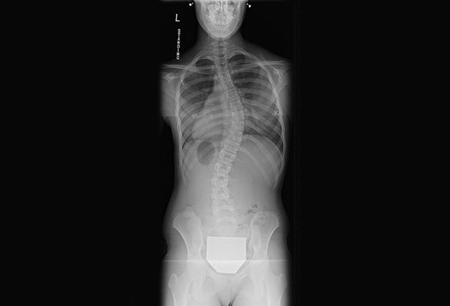Summary
Definition
History and exam
Key diagnostic factors
- age >10 years
- 6 to 12 months post puberty
- postural asymmetry
- absent or minimal pain
- absence of neurologic symptoms with normal neurologic exam
- paraspinal prominences on forward bending
- scoliometer measurement of >5° at paraspinal prominence
- symmetric abdominal reflexes
Other diagnostic factors
- shoulder asymmetry
- waist-line asymmetry
- thoracic wall or breast asymmetry
- normal gag reflex
- truncal decompensation
Risk factors
- positive family history
- peak adolescent growth spurt
Diagnostic tests
1st tests to order
- clinical exam
Tests to consider
- standing PA x-rays of cervical, thoracic, and lumbar spine, and pelvis
- standing lateral x-rays of cervical, thoracic, and lumbar spine, and pelvis
- MRI of cervical, thoracic, lumbar, and sacral spine, and brainstem
Treatment algorithm
screening scoliometer measurement <5° or coronal Cobb angle measurement of ≤10°
standing coronal Cobb angle measurement of 11° to 20°
standing coronal Cobb angle measurement of 21° to 45°
standing coronal Cobb angle measurement of >45°
Contributors
Authors
Joshua M. Eisenberg, MD
Clinical Research Fellow
Department of Orthopaedics and Rehabilitation
University of Iowa Hospitals and Clinics
Iowa City
IA
Disclosures
JME declares that he has no competing interests.
Stuart L. Weinstein, MD
Ignacio V. Ponseti Chair and Professor of Orthopaedics
Department of Orthopaedics and Rehabilitation
University of Iowa Hospitals and Clinics
Iowa City
IA
Disclosures
SLW has received royalties from Wolters Kluwer for text book editing. SLW is a former board member of the Journal of Bone and Joint Surgery (ended in 2013); he was involved in a NIH RO1 research grant programme until 2015; and he is an author of several references cited in this topic.
Acknowledgements
Dr Stuart L. Weinstein and Dr Joshua M. Eisenberg would like to thank Dr Ryan M. Ilgenfritz, a previous contributor to this topic.
Disclosures
RMI declared that he had no competing interests.
Peer reviewers
John M. (Jack) Flynn, MD
Associate Chief of Orthopaedic Surgery
The Children's Hospital of Philadelphia
Philadelphia
PA
Disclosures
JMF declares that he has no competing interests.
Amer Samdani, MD
Director
Pediatric Spine Surgery
Shriners Hospitals for Children
Philadelphia
PA
Disclosures
AS is a paid consultant for Synthes Spine, Depuy Spine, and SpineVision.
Andre Tomasino, MD
Neurosurgeon
Department of Neurosurgery
Hospital Munich-Bogenhausen
Munich
Germany
Disclosures
AT declares that he has no competing interests.
References
Key articles
Parent S, Newton PO, Wenger DR. Adolescent idiopathic scoliosis: etiology, anatomy, natural history, and bracing. Instr Course Lect. 2005;54:529-36. Abstract
Yaszay B, Newton PO. Idiopathic scoliosis. In: Weinstein SL, Flynn JM, Crawford HA, eds. Lovell and Winter's Pediatric Orthopaedics. 8th ed. Philadelphia: Wolters Kluwer, 2021:659-720.
Lenke LG, Betz RR, Harms J, et al. Adolescent idiopathic scoliosis: a new classification to determine extent of spinal arthrodesis. J Bone Joint Surg Am. 2001 Aug;83(8):1169-81. Abstract
Cheng JC, Castelein RM, Chu WC, et al. Adolescent idiopathic scoliosis. Nat Rev Dis Primers. 2015 Sep 24;1:15030. Abstract
Harrop JS, Birknes J, Shaffrey CI. Noninvasive measurement and screening techniques for spinal deformities. Neurosurgery. 2008 Sep;63(3 Suppl):46-53. Abstract
Negrini S, Donzelli S, Aulisa AG, et al. 2016 SOSORT guidelines: orthopaedic and rehabilitation treatment of idiopathic scoliosis during growth. Scoliosis Spinal Disord. 2018;13:3.Full text Abstract
Yawn B, Yawn RA. Efficacy of school scoliosis screening. Orthopedics. 2001 Apr;24(4):317. Abstract
Weinstein SL, Dolan LA, Spratt KF, et al. Health and function of patients with untreated idiopathic scoliosis: a 50-year natural history study. JAMA. 2003 Feb 5;289(5):559-67.Full text Abstract
Weinstein SL. Idiopathic scoliosis. Natural history. Spine. 1986 Oct;11(8):780-3. Abstract
Dickson JH, Mirkovic S, Noble PC, et al. Results of operative treatment of idiopathic scoliosis in adults. J Bone Joint Surg Am. 1995 Apr;77(4):513-23. Abstract
Betz RR, Harms J, Clements DH 3rd, et al. Comparison of anterior and posterior instrumentation for correction of adolescent thoracic idiopathic scoliosis. Spine. 1999 Feb 1;24(3):225-39. Abstract
Danielsson AJ, Nachemson AL. Back pain and function 22 years after brace treatment for adolescent idiopathic scoliosis: a case-control study-part I. Spine (Phila Pa 1976). 2003 Sep 15;28(18):2078-85; discussion 2086. Abstract
Edgar MA, Mehta MH. Long-term follow-up of fused and unfused idiopathic scoliosis. J Bone Joint Surg Br. 1988 Nov;70(5):712-6.Full text Abstract
Weinstein SL, Dolan LA, Cheng JC, et al. Adolescent idiopathic scoliosis. Lancet. 2008 May 3;371(9623):1527-37. Abstract
Reference articles
A full list of sources referenced in this topic is available to users with access to all of BMJ Best Practice.

Differentials
- Congenital scoliosis
- Neuromuscular scoliosis
- Syringomyelia
More DifferentialsGuidelines
- Adolescent idiopathic scoliosis
- Screening for adolescent idiopathic scoliosis: a systematic evidence review for the U.S. Preventive Services Task Force
More GuidelinesLog in or subscribe to access all of BMJ Best Practice
Use of this content is subject to our disclaimer